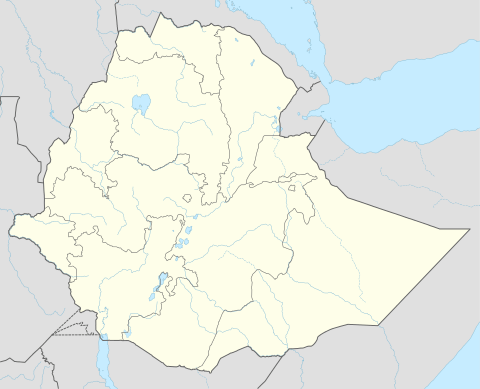Dangila
| Dangila | |
|---|---|
 Dangila Location in Ethiopia | |
| Coordinates: 11°16′N 36°50′E / 11.267°N 36.833°E | |
| Country | Ethiopia |
| Region | Amhara Region |
| Zone | Agew Awi Zone |
| Population (2005) | |
| • Total | 26,704 (est) |
| Time zone | EAT (UTC+3) |
Dangila is a town in northwestern Ethiopia. Located in the Agew Awi Zone of the Amhara Region, this town has a latitude and longitude of 11°16′N 36°50′E / 11.267°N 36.833°ECoordinates: 11°16′N 36°50′E / 11.267°N 36.833°E with an elevation of 2137 meters above sea level. It is the largest of three towns in Dangila woreda.
History
One of the earliest mentions of Dangila was when the Emperor Susenyos passed through the town in 1620.[1]
As late as the 1930s, Dangila was an important center of the African slave trade. Nagadras Habtewerq, director of customs in the town during the early 1930s, achieved a measure of success in liberating slaves despite the determined opposition of influential Gojjame figures like the slaver Fitawrari Zelleqe.[2]
The British maintained a consulate in Dangila in the 1920s and 1930s, manned by R.E. Cheesman, who spent a considerable amount of energy mapping Agawmeder and nearby Gojjam.[3]
Dangila has played a role in Ethiopian literature. As a young man, Haddis Alemayehu, who was to become the foremost Amharic fiction writer, served for two years as a customs clerk at Dangila in the early 1930s. When consul Cheesman left, the consulate building was turned into a primary school, and Haddis Alemayehu became its headmaster for a year. Another author is Abbe Gubennya, who attended grades 1-8 at the Bitwedded Mengesha Jembere school in the 1950s.[2]
Demographics
Based on figures from the Central Statistical Agency in 2005, Dangila has an estimated total population of 26,704 of whom 12,916 are men and 13,788 are women.[4] The 1994 census reported this town had a total population of 15,437 of whom 6,796 were men and 8,641 were women.
Notes
- ↑ G.W.B. Huntingford, Historical Geography of Ethiopia from the first century AD to 1704 (London: British Academy, 1989), p. 176
- 1 2 "Local History in Ethiopia" (pdf) The Nordic Africa Institute website (accessed 17 December 2007)
- ↑ He published an account his explorations in Lake Tana and the Blue Nile, London 1936.
- ↑ CSA 2005 National Statistics, Table B.4